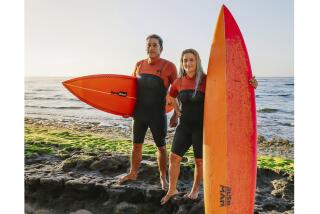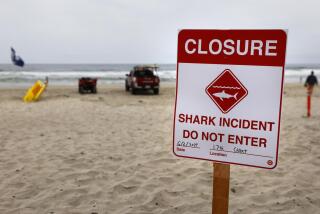Angler Dies in Mysterious Shark Landing
- Share via
A Fijian fisherman reportedly died after a 12-foot shark jumped into his boat and attacked him while he slept.
State-owned Radio Fiji said the bizarre attack occurred last Wednesday off one of the remote islands in the South Pacific region.
Five men had been sleeping in the 16-foot fishing boat, which was anchored in open seas when the attack occurred, according to a report by Reuters.
The shark somehow made it into the boat and nearly severed the right leg and right hand of villager Kinijioji Vindovi, 69.
The other men tried to take the boat in but were hampered by strong winds. Vindovi died from loss of blood at a local hospital.
Fijian police said they were investigating the incident.
*
The salmon craze seems to be affecting more than the fish and fishermen in the Ventura-Santa Barbara area.
“Let’s just say that last weekend was one of the busiest ever,” said Deputy Jim Chase with the Ventura Harbor Patrol. “The parking lot was completely full, and the overflow parking lot was completely full. Cars [towing boats] were lined up [for hundreds of yards] all the way out on Harbor Boulevard.”
At one point last weekend, as many as 100 boats were launching per hour.
Meanwhile, people are wondering how long the fish will stay. It has been more than two months, yet there seems no end to the supply of baitfish on which the salmon are feeding. Experts believe, however, that an extensive heat wave would probably send them swimming north where they belong.
*
It’s not creating as much excitement, but an outstanding barracuda bite is under way off the Orange County-north San Diego County coast and a fair white seabass bite is taking place on the backside of Santa Catalina Island.
The seabass bite has been steady for the past few days and one-fish limits of fish to 40 pounds have been the rule.
The twilight season, meanwhile, has been slow to develop, but that could be changing. Anglers aboard L.A. Harbor’s Matt Walsh bagged 108 sand bass Monday night.
*
California’s first Free Fishing Day, when prospective anglers can participate in the sport without buying a fishing license, is June 10.
To help promote the sport, the Department of Fish and Game is conducting a jamboree on Shellmaker Island at Upper Newport Bay Ecological Reserve in Newport Beach.
Equipment will be available, the DFG says, “to land the bay’s halibut, sand bass, perch, corbina and shark.”
The event is 8 a.m.-3 p.m. Details: (714) 640-6746.
*
Believe it or not: A group of Girl Scouts on a recent trip to Arizona’s Mongollan Rim were scared off by a black bear that apparently wanted only to satisfy its sweet tooth.
The girls were sitting around the campfire enjoying S’mores, a popular treat consisting of marshmallows and chocolate melted between graham crackers.
Said an Arizona wildlife manager: “It didn’t touch any of the chocolate, or graham crackers. It just ate the marshmallows. But it was eating alone. All the girls were scared away.”
*
In Southern California’s San Bernardino Mountains, Department of Fish and Game biologist Kevin Brennan has had his hands full dealing with bad news bears of a different sort: those that prefer human garbage to natural food in the woods.
Brennan last week watched as a 150-pound black bear went from house to house rummaging through garbage cans in the rural community of Lytle Creek west of Interstate 15.
Brennan coaxed the bear into the hills with what he calls “bear buster bullets,” which he says hurt but do no damage.
“We try to leave them with a rotten taste for human companionship,” he said. “Unfortunately, it will do no good if people won’t keep their trash secured.”
Brennan said bears are attracted to garbage much the way humans are to junk food.
“There is plenty of bear forage in the mountains, so they don’t need to visit suburban areas to find food, but when they smell that greasy human garbage, some bears can’t resist it,” he said.
*
Boaters: In an effort to save lives, the Arizona Game and Fish Department says it is stepping up its enforcement of drinking-and-boating laws by establishing checkpoints along the popular Colorado River from Hoover Dam to Parker Dam.
“It has been determined that more than 50% of boating accidents that result in death can be traced to alcohol use,” said Mark Quigley, Boating Education officer for the department.
The first checkpoint is expected to be set up at Lake Mohave, which received 170,000 visitors last June.
More to Read
Sign up for Essential California
The most important California stories and recommendations in your inbox every morning.
You may occasionally receive promotional content from the Los Angeles Times.













